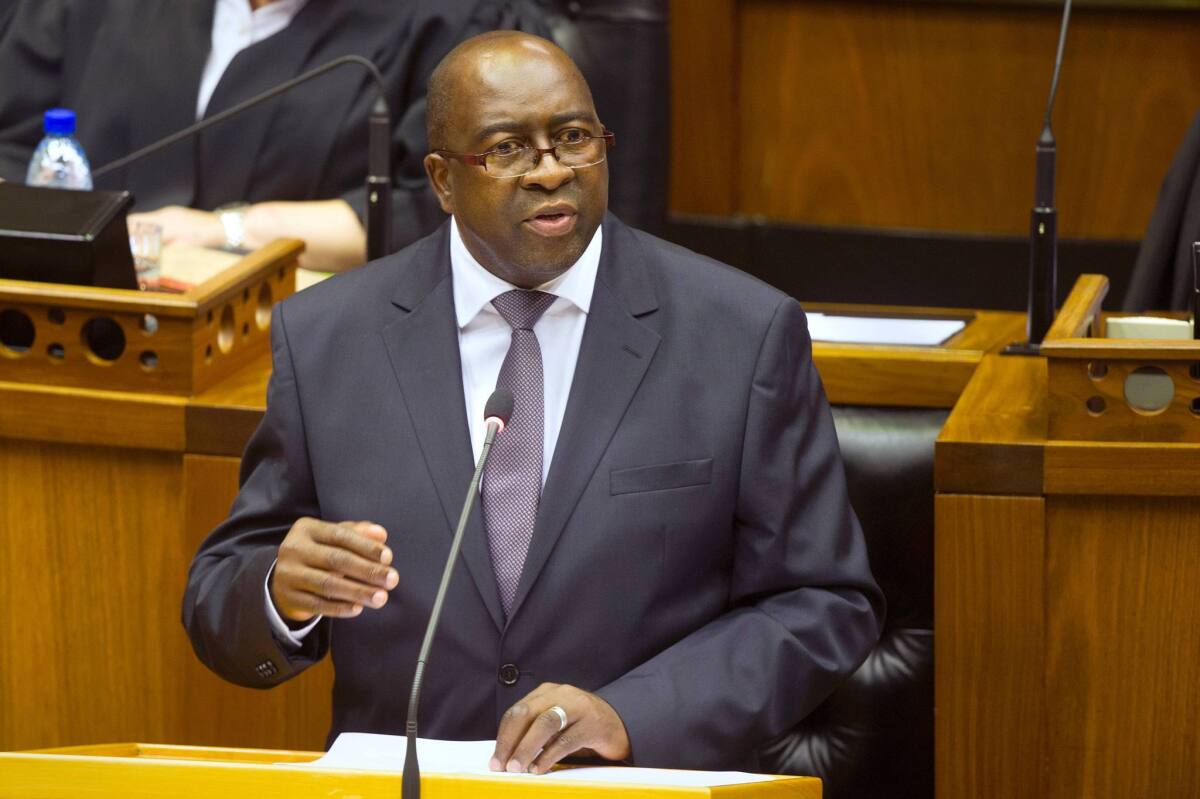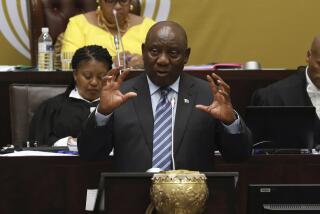South African president fires respected finance minister; rand and markets tumble

Then-South African Finance Minister Nhlanhla Nene delivers a speech at the National Assembly in Cape Town on Feb. 25.
Reporting from Johannesburg, South Africa — South Africa’s financial markets were in shock Thursday after President Jacob Zuma abruptly fired his finance minister, triggering a rapid slide in the currency, the rand.
Finance Minister Nhlanhla Nene, who was dismissed late Wednesday, had been seen as a steady hand who was trying to rein in government spending and address the country’s ballooning budget deficit. The president replaced him with a lawmaker with limited financial experience, David Van Rooyen, a former mayor from a municipality west of Johannesburg.
“David who?” was one South African media headline.
NEWSLETTER: Get the day’s top headlines from Times Editor Davan Maharaj >>
Markets were disconcerted because of the perception that Nene was fired for insisting on more discipline in government spending, treading on the toes of a powerful presidential ally.
The South African currency sank to a record low after the announcement, reaching 15.3857 rands to the dollar late Wednesday. It recovered only slightly Thursday, to 15.1455. Fifteen is considered a significant benchmark, and South Africa has sought to keep the rand below it.
Banking stocks tumbled by 6.59% Thursday, while financial stocks declined 4.26%.
Nene’s dismissal came just days after markets were shaken by two international credit-rating agencies’ decision to downgrade South Africa’s rating, citing poor growth and weak business confidence.
Fitch Ratings downgraded South Africa’s foreign debt rating to a notch above junk status, BBB-, while Standard and Poor’s changed its outlook for the country from stable to negative.
Analysts have expressed doubt about the ability of the governing African National Congress to make the changes needed to turn around the nation’s economy, the continent’s second-largest after Nigeria’s.
With persistently high unemployment and the economy narrowly avoiding sliding into recession in the third quarter, they see little prospect that the economy can provide the jobs needed to level the country’s severe inequality. South Africa’s reserve bank has predicted annual growth of 1.4%, well short of that required to create jobs for a massive group of poorly educated, unskilled workers.
Without a significant change in policy, some analysts predict, the rand may slip to 16 to the dollar, and ratings agencies could downgrade the country’s credit to junk status, which would make its debt servicing costs much steeper.
Meanwhile, a leadership struggle within the ANC has been gaining momentum, although elections are not due until 2019. The top trending Twitter hashtag in the wake of the Nene announcement was #ZumaMustFall.
Nene had clashed with Dudu Myeni, one of Zuma’s close protégées and chairwoman of the state-owned airline, South African Airways, which in recent years has been bleeding cash and required successive government bailouts. Nene last week insisted that the SAA board stick to a deal approved by the Finance Ministry on leasing new planes, but the board wanted to restructure the deal, adding significant costs.
Nene also pushed back against an ambitious, multibillion-dollar plan to build nuclear power stations to address chronic power outages, reportedly citing concerns over the cost.
South Africa, which relies heavily on trade with China, has been hit hard by the decline in global commodities prices. Financial markets have been increasingly nervous about the government’s seeming inability to resolve numerous serious structural problems in the economy, notably huge gaps in electricity infrastructure, which led to widespread power outages earlier this year, and a chronic shortage of skilled workers.
Labor strikes in the mining and industrial sectors have also hurt business confidence. Meanwhile, a recent Transparency International survey, which polls perceptions of corruption, saw South Africa ranked 67th of 175 countries, a slide from the 42nd position two years ago.
The World Bank ranked South Africa 73rd of 189 countries for ease of doing business in 2016, a fall of four positions from its 2015 ranking.
South African commentators reacted with shock to Nene’s dismissal, focusing on Zuma’s failure to explain why he took the action.
“Even for ministers in the belly of the beast of the Zuma presidency, it seemed too absurd, too reckless, too deadly to suddenly remove the Minister of Finance for no good reason,” wrote Ranjeni Munusamy on the Daily Maverick news site. “Other portfolios, maybe. Finance is the Holy Grail.”
He wrote that that even insiders were shocked when the ax fell.
Barclays Africa issued a statement that reflected what many others were saying: The sudden dismissal had battered the government’s financial credibility and raised questions about its willingness to rein in spending, and would leave credit-ratings agencies with their “finger on the trigger.”
“The quick sell-off in the rand in the wake of the announcement indicates, in our view, that the markets are interpreting the cabinet reshuffle as a blow to the institutional credibility of the national treasury,” the statement read. “Nene’s removal, which will likely raise concerns about the commitment to fiscal discipline, has generated considerable market volatility, amid markets already spooked by Friday’s negative rating agency announcements.”
The dismissal came with the release of a survey Thursday showing South African consumer confidence at its lowest level since 2001, according to Reuters.
There have been other issues that have raised doubts about the government’s direction lately. South Africa’s economy benefits from a U.S. preferential-trade measure, the African Growth and Opportunity Act, but the United States recently threatened to drop South Africa from the deal because of the Zuma government’s long-standing refusal to allow U.S. chicken imports.
Follow @RobynDixon_LAT for news from Africa
ALSO
French investigate choice of Eugene, Ore., for world track championships
Paris climate talks: Coming down to the wire with key issues still unresolved
Iowa tow truck driver shows why Trump backers stand by him after call for Muslim ban
More to Read
Sign up for Essential California
The most important California stories and recommendations in your inbox every morning.
You may occasionally receive promotional content from the Los Angeles Times.










